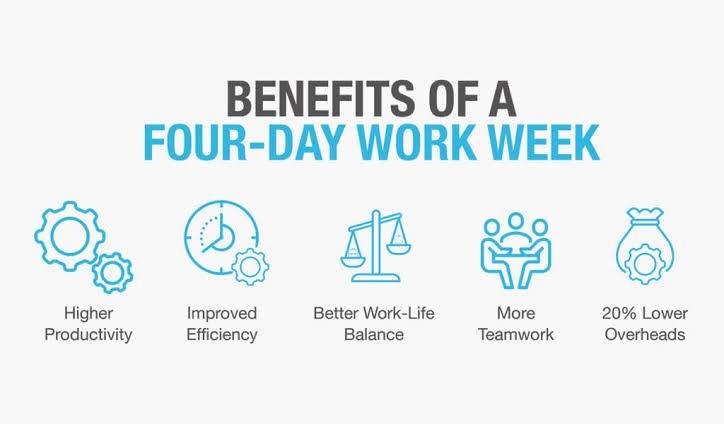The world’s largest four-day working week trial comes to a close
The recent trial of a four-day working week in the UK has demonstrated that this model of working is both feasible and beneficial for many organizations. The pilot involved 61 organizations and 2,900 employees who were required to work four days a week while producing the same output for the same pay as they would have in a five-day week. The results of the trial have been overwhelmingly positive, with almost all of the companies choosing to continue with a reduced working hours model.
According to the report on the scheme, 92% of participating employees are sticking with the four-day week, and company revenue rose by 1.4% on average. Employee stress levels dropped by 39%, employee burnout rates fell by 71%, and 54% of workers felt a reduction in negative emotions. Furthermore, there was better job retention, and a substantial reduction in sick days taken during the trial period from June to December 2022.
Increased job retention and revenue for participating companies
The trial’s success has led to many companies questioning whether the five-day week is still necessary, as the benefits of a shorter working week have become evident. This sentiment is echoed in a 2019 white paper on the four-day working week published by a team from the Henley Business School, which found that there is no “one-size-fits-all” solution to flexible working. However, any shift to a shorter working week needs to be thoroughly planned by companies and their employees.

While the results of the trial are promising, there is still work to be done to ensure that a four-day week can be successfully implemented across different industries and sectors. This may involve tailoring the approach to suit the specific needs of different organizations and their employees. For example, some companies may need to make changes to their working practices, such as increasing the use of technology, to ensure that productivity levels are maintained.
Shifting towards a more flexible and sustainable work culture
The benefits of a four-day working week are clear, and many companies are now exploring this option as a way of improving employee well-being and productivity. The trial has shown that a shorter working week can lead to significant reductions in stress levels and burnout rates, which can have a positive impact on employee retention and overall business performance. It has also demonstrated that the four-day week is a viable option for many organizations, and can be implemented without a negative impact on revenue or productivity.
While the success of the trial is a positive step forward for flexible working, it is important to note that there is still much work to be done to ensure that this model of working is sustainable in the long term. Companies need to consider how a four-day week can be implemented alongside other policies and practices that support employee well-being and work-life balance. This may involve offering flexible working hours, providing access to mental health support services, and promoting a culture of openness and transparency in the workplace.
Overall, the trial of the four-day working week in the UK has been a resounding success, with almost all of the participating companies opting to continue with a reduced working hours model. The benefits of this approach are clear, with significant improvements in employee well-being and productivity. As companies continue to explore different models of working, it is important to consider the potential benefits of a shorter working week and to work towards creating a more flexible and sustainable work culture.
DRINKING COKE & PEPSI MAY LEAD TO LARGER TESTICLES AND MORE TESTOSTERONE AS PER RECENT STUDY












